You are here
New Releases
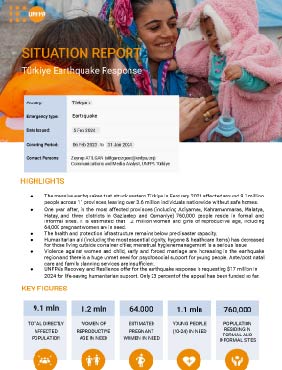
Situation Report: Türkiye Earthquake Response after 1 year
- The massive earthquakes that struck eastern Türkiye in February 2023 affected around 9.1 million people across 11 provinces, leaving over 3.6 million individuals nationwide without safe homes.
- One year after, in the most affected provinces (including Adiyaman, Kahramanmaras, Malatya, Hatay, and three districts in Gaziantep and Osmaniye) 760,000 people reside in formal and informal sites. It is estimated that 1.2 million women and girls of reproductive age, including 64,000 pregnant women are in need.
- The health and protection infrastructure remains below pre-disaster capacity.
- Humanitarian aid (including the most essential dignity, hygiene & healthcare items) has decreased for those living outside container cities; menstrual hygiene management is a serious issue.
- Violence against women and child, early and forced marriage are increasing in the earthquake region and there is a huge unmet need for psychosocial support for young people. Ante/post natal care and family planning services are insufficient.
- UNFPA’s Recovery and Resilience offer for the earthquake response is requesting $17 million in 2024 for life-saving humanitarian support. Only 23 percent of the appeal has been funded so far.
More information is in our situation report.
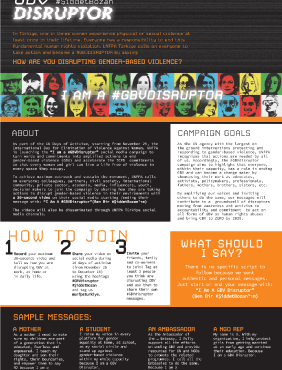
#GBVdisruptor One Pager
As part of the 16 Days of Activism, starting from November 25, the International Day for Elimination of Violence Against Women, UNFPA is launching the “I am a #GBVDisruptor” social media campaign to turn words and commitments into amplified actions to end gender-based violence (GBV) and accelerate the ICPD commitments so that every woman and girl can live a life free of violence in every space they occupy.
To achieve maximum outreach and sustain the movement, UNFPA calls on everyone; colleagues, partners, civil society, international community, private sector, academia, media, influencers, youth, decision makers to join the campaign by sharing how they are taking actions to disrupt gender-based violence in their environments with a 30-second video on their social media starting /ending their message with: “I Am A #GBVDisruptor.”
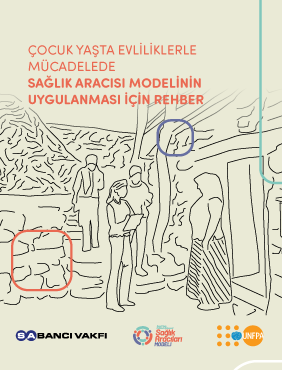
GUIDE FOR THE APPLICATION OF THE HEALTH MEDIATORS MODEL IN THE FIGHT AGAINST CHILD MARRIAGE
This guide introduces the health mediators model that the United Nations Population Fund, UNFPA has been implementing since 2006 and has achieved successful results, and how this model is applied in the context of the projects to prevent child, early and forced marriages carried out with the support of the Sabancı Foundation since 2018. The guide explains the basic principles of the health mediator model, implementation steps and how successful results are achieved.
Directory; It contains practical information for non-governmental organizations, public institutions, local governments and other relevant parties fighting against child, early and forced marriages on how they can integrate the health mediators model into their own work and what approaches, methods and tools they can use.
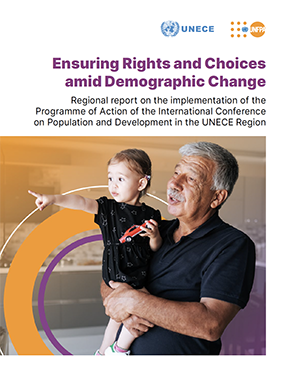
Ensuring Rights and Choices amid Demographic Change
As the international community prepares to mark the 30th anniversary of the International Conference on Population and Development (ICPD), held in Cairo in 1994, UNECE and UNFPA have collaborated to evaluate achievements and setbacks in the implementation of the ICPD Programme of Action and the recommendations made in the 2013 Chair’s Summary. This report highlights how recent crises have had an impact on key population and development trends in the UNECE region, identifies areas where it is necessary to accelerate efforts and provides examples of concrete policy responses to both long-standing and emerging issues.
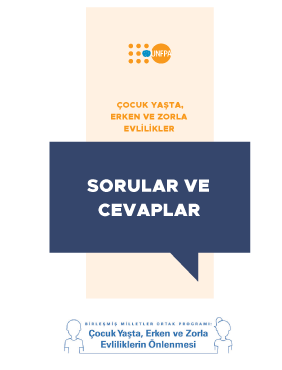
Child, Early and Forced Marriages: Questions and Answers
The Joint United Nations Program for the Prevention of Child, Early and Forced Marriage is a countrywide program initiated by UNICEF, UN Women, IOM, UNFPA and UNHCR. This program takes a multi-sectoral approach to the problem of preventing child, early and forced marriages. The main aim of the program is to promote positive social norms and behavioral change at the community level, and to create and strengthen prevention and intervention mechanisms.
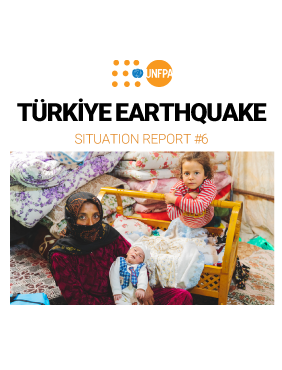
Türkiye Earthquake Situation Report #6
The massive earthquakes that struck eastern Türkiye on 6 February 2023 affected 11 provinces with an area of about 350,000 km2 (140,000 sq mi). As a result of the earthquakes, official reports indicated that more than 50,000 people died, over 106,000 people sustained injuries, and it is estimated that the total number of people with disabilities will increase with the injured survivors. Approximately 280,000 buildings collapsed or were extensively damaged, including several hospitals and social service centers. Millions have been severely affected by the massive loss of livelihoods and assets.
Six months after the devastating earthquakes of February 2023, health and protection infrastructure and services remain critically affected. Among the 9.1 million people directly affected by the earthquakes, 3 million had to leave their homes and reside in formal or informal settlements in the affected area or have moved to other provinces. Efforts in water, sanitation, hygiene (WASH) and protection assistance are required to improve the current living conditions in tent settlements. The restoration of housing units and public infrastructure, including public service buildings, remains the priority. The authorities are consolidating informal and formal tent sites, transitioning residents to container cities to provide them with better services.
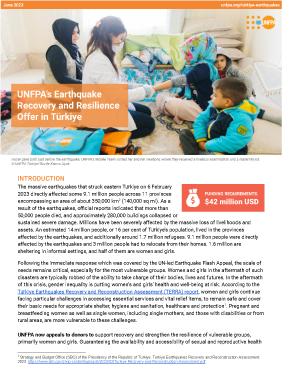
UNFPA's Recovery & Resilience Offer
The massive earthquakes that struck eastern Türkiye on 6 February 2023 directly affected some 9.1 million people across 11 provinces encompassing an area of about 350,000 km2 (140,000 sq mi). As a result of the earthquakes, official reports indicated that more than
50,000 people died, and approximately 280,000 buildings collapsed or sustained severe damage. Millions have been severely affected by the massive loss of livelihoods and assets. An estimated 14 million people, or 16 per cent of Türkiye’s population, lived in the provinces
affected by the earthquakes, and additionally around 1.7 million refugees. 9.1 million people were directly affected by the earthquakes and 3 million people had to relocate from their homes. 1.6 million are sheltering in informal settings, and half of them are women and girls.
Following the immediate response which was covered by the UN-led Earthquake Flash Appeal, the scale of needs remains critical, especially for the most vulnerable groups. Women and girls in the aftermath of such disasters are typically robbed of the ability to take charge of their bodies, lives and futures. In the aftermath of this crisis, gender inequality is putting women’s and girls' health and well-being at risk. According to the Türkiye Earthquakes Recovery and Reconstruction Assessment (TERRA) report, women and girls continue facing particular challenges in accessing essential services and vital relief items, to remain safe and cover their basic needs for appropriate shelter, hygiene and sanitation, healthcare and protection. Pregnant and breastfeeding women as well as single women, including single mothers, and those with disabilities or from rural areas, are more vulnerable to these challenges.
UNFPA now appeals to donors to support recovery and strengthen the resilience of vulnerable groups, primarily women and girls. Guaranteeing the availability and accessibility of sexual and reproductive health (SRH) services and commodities and increasing the effectiveness of gender-based violence (GBV) prevention and mitigating measures is critical to ensuring the rights, safety and dignity of women, girls and groups with specialized needs across the earthquake-affected provinces, as well as in provinces where people displaced by the earthquakes live.
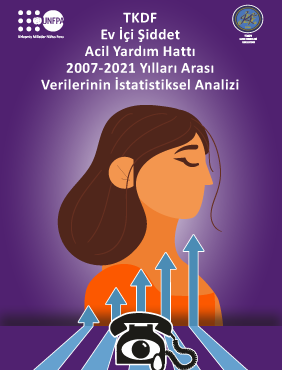
Statistical Analysis Report of Domestic Violence Emergency Hotline Data for the Years 2007-2021
The Emergency Hotline was established by Hürriyet newspaper in 2004 within the framework of the "End Domestic Violence" Campaign to provide legal and psychological support to callers' problems. In 2014, the line was transferred to the Turkish Women's Associations Federation (TKDF) and has been operated by TKDF since then. Operating on a seven-day, 24-hour (24/7) basis, the Home Violence Emergency Aid Line provides services in Turkish as well as English, Arabic, Kurdish, and Persian languages according to the needs of the callers.
The line primarily works based on the principle of preventing all types of violence, especially domestic violence against women and girls, and taking all necessary measures urgently when violence occurs, in order to evacuate the victim from the violent environment with the least possible harm. Upon requesting support, the callers are referred to relevant institutions and organizations by psychologists, social workers, and legal experts specializing in violence, according to their wishes and needs. Follow-up is conducted to prevent further harm to women by monitoring the situation and providing support.
Applications to this emergency hotline are made by calling the numbers 0 212 656 96 96 or 0 549 656 96 96, and initially, social workers or psychologists answer the calls. The experts who provide recommendations based on the situation to ensure that the police or gendarmerie reach the victim as soon as possible in emergency cases. Afterwards, the services and recommendations provided to the victim are followed up. The line also provides various referrals and counseling services depending on the nature and time of violence in calls made from outside the household.
This report includes an analysis of calls received by the Domestic Violence Emergency Hotline conducted by the Turkish Women's Associations Federation between October 2007 and December 2021. The data analysis was performed by Tandans Data Science Consultancy.
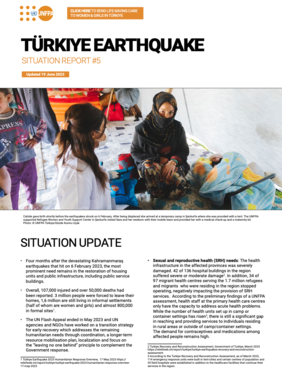
Türkiye Earthquake Situation Report #5
Situation Report on UNFPA’s response to the humanitarian emergency caused by the earthquakes in Türkiye.
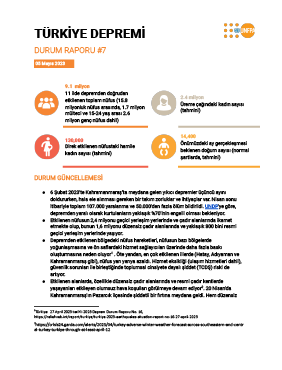
Türkiye Earthquake Situation Report #7
Situation Report on UNFPA’s response to the humanitarian emergency caused by the earthquakes in Türkiye.